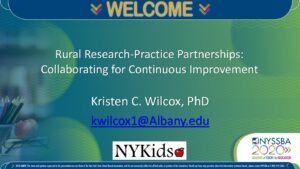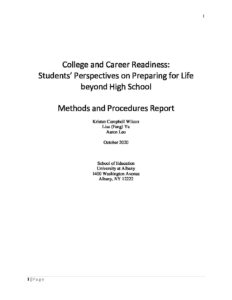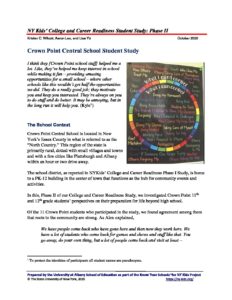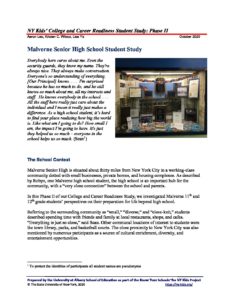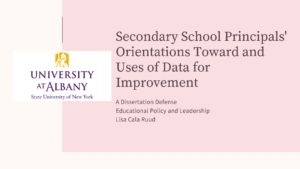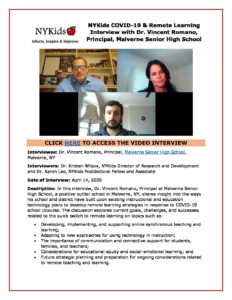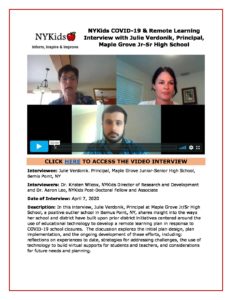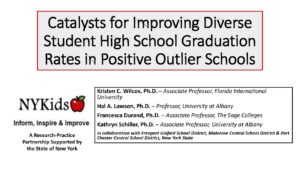Publication Year: 2020
This presentation delivered by Dr. Kristen C. Wilcox at the New York State School Boards Association annual conference explores the role of Research-Practice Partnerships in improving school out comes in rural schools.
Dr. Kristen C. Wilcox delivered this presentation at this year’s New York State School Boards Association annual conference. The topic is on how Rural Research-Practice Partnerships can assist educators in improving school outcomes.
This report details the methods utilized in NYKids recent follow-up to the College and Career Readiness study of 2018.
This report details the methods utilized in NYKids recent follow-up to the College and Career Readiness study of 2018. In this study, we return to two of the original seven positive-outlier high schools to conduct interviews with students about their experiences and perspectives. The report here details the sampling procedures, data collection and analysis, and includes the instruments used for this study.
This qualitative case study highlights the perspectives of students from Crown Point Central School, an odds-beating school part of our Study of College and Career Readiness among odds-beating secondary schools.
This case study is one of two reports which build from our Phase I research into College and Career Readiness. For this study, we returned to odds-beating Crown Point Central School to conduct interviews and focus groups with students about their experiences in school and plans for after graduation.
This qualitative case study highlights the perspectives of students from Malverne High School, an odds-beating school part of our Phase I Case Study on College and Career Readiness.
This case study is one of two reports which build from our Phase I research into College and Career Readiness. For this study, we returned to odds-beating Malverne High School to conduct interviews and focus groups with students about their experiences in school and plans for after graduation.
Dr. Lisa Cala Ruud’s dissertation defense presentation on how odds-beating school principals use data
How do high school principals use data to make decisions? Dr. Lisa Cala Ruud explored this question in her recent dissertation study based on the NYKids College and Career Readiness Phase 1 Study. Drawing on interviews, surveys, and document reviews, Cala Ruud focused on three secondary schools with above-predicted graduation rates in her analysis. Cala Ruud shows how these principals creatively use data to address increasingly complex challenges in their schools.
In this interview, Dr. Vincent Romano, Principal at Malverne Senior High School, a positive outlier school in Malverne, NY, shares insight into the ways his school and district have built upon existing instructional and education technology plans to develop remote learning strategies in response to COVID-19 school closures.
(A link to the video interview is available in this attached document.)
In this video interview conducted by NYKids Director, Dr. Kristen Wilcox, and NYKids Post-Doctorate Fellow, Dr. Aaron Leo; Dr. Vincent Romano, Principal at Malverne Senior High School, a positive outlier school in Malverne, NY, shares insight into the ways his school and district have built upon existing instructional and education technology plans to develop remote learning strategies in response to COVID-19 school closures. The discussion explores current goals, challenges, and successes related to the quick switch to remote learning on topics such as: developing, implementing, and supporting online synchronous teaching and learning; adapting to new approaches for using technology in instruction; the importance of communication and connective support for students, families, and teachers; considerations for educational equity and social-emotional learning; and future strategic planning and preparation for ongoing considerations related to remote teaching and learning.
In this interview, Julie Verdonik, Principal at Maple Grove Jr/Sr High School, a positive outlier school in Bemus Point, NY, shares insight into the ways her school and district have built upon prior district initiatives centered around the use of educational technology to develop a remote learning plan in response to COVID-19 school closures.
(A link to the video interview is available in this attached document.)
In this video interview conducted by NYKids Director, Dr. Kristen Wilcox, and NYKids Post-Doctorate Fellow, Dr. Aaron Leo, Julie Verdonik, Principal at Maple Grove Jr/Sr High School, a positive outlier school in Bemus Point, NY, shares insight into the ways her school and district have built upon prior district initiatives centered around the use of educational technology to develop a remote learning plan in response to COVID-19 school closures. The discussion explores the initial plan design, plan implementation, and the ongoing development of these efforts, including: reflections on experiences to date, strategies for addressing challenges, the use of technology to build virtual supports for students and teachers, and considerations for future needs and planning.
Catalysts for Improving Diverse Student High School Graduation Rates in Positive Outlier Schools – 2020 Carnegie Virtual Summit Poster Session Presentation
In an accompanying video (available at: https://ny-kids.org/nykids-carnegie-summit-2020-virtual-poster-presentation-2/), Dr. Kristen Wilcox, NYKids Director of Research and Development, shares this NYKids presentation for a 2020 Carnegie Virtual Summit invited poster session, “Catalysts for Improving Diverse Student High School Graduation Rates in Positive Outlier Schools”. The presentation was shared during the 2020 Carnegie Virtual Summit on April 1 – 3, 2020 as part of an asynchronous poster session under the strand, “Improving Capacity”.

